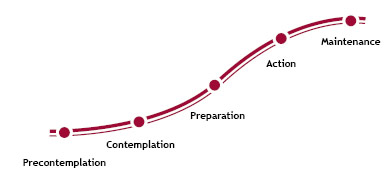行動変容のトランスセオレティカル・モデル
The transtheoretical model of behavior change

行動変容のトランスセオレティカル・モデル
The transtheoretical model of behavior change

ウィキの英語版の"Transtheoretical model"では……
"The transtheoretical model (TTM) of behavior change is an integrative theory of therapy that assesses an individual's readiness to act on a new healthier behavior, and provides strategies, or processes of change to guide the individual. The model is composed of constructs such as: stages of change, processes of change, levels of change, self-efficacy, and decisional balance," と記し、その出典を、Prochaska, James O.; DiClemente, Carlo C. (2005). "The transtheoretical approach". In Norcross, John C.; Goldfried, Marvin R. Handbook of psychotherapy integration. Oxford series in clinical psychology (2nd ed.). Oxford; New York: Oxford University Press. pp. 147–171. としている。
この理論の提唱者であるジェームズ・プロチェスカ(James O. Prochaska, 1943- )は、すでに1984年にディクレメンテとの共著でこの用語を提唱している。
トランスセオレティカルモデルは、英語のアクロニム から、TTMと表現され、「変化の段階(Stages of change)」を図式化する表現がとられる。この段階は、通常(提唱者たちにより)5段階にわけられて、1)予期前段階 (Precontemplation)、2)予期段階(Contemplation)、3)準備段階(Preparation)、4)実行段階 (Action)、5)維持段階(Maintenance)、に分類されている。もちろん、これは再発——薬物利用者は再利用——して、最初のステージに 逆戻りすることも、想定されている。健康維持や「よい習慣」の維持には、行動学的な意味での再強化のプロセスが必要だと考えられているからである。また、 それに対するそれぞれの期間のようなものも想定されている(図)


出典:Transtheoretical
model, by Wiki
本文……
リンク
文献
その他の情報